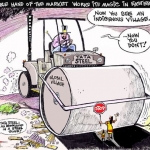Explore Publications
Four former employees of Polo Ralph Lauren filed a lawsuit today in San Francisco Superior Court against the Polo Ralph Lauren Corporation, alleging that the company repeatedly violated the rights of its employees, according to Patrick Kitchin, a lawyer for the plaintiffs.
Read MoreThe Bush administration sought agreement from U.S. farm groups for a 70 percent cut in their most trade-distorting subsidies as a way to save world trade talks but was rejected, industry sources said on Tuesday.
Read MoreWhat was once a farming village of indigenous peoples is now a vast coffee plantation that straddles six towns in three provinces. The plantation prevents the T'boli villagers from expanding their own farmland.
Read MoreThe development of a potentially rare and lucrative platinum mine near a reserve in Northern Ontario has prompted a First Nation to sue the provincial government while it faces a $10 billion lawsuit from a Canadian exploration company.
Read MoreNorth Carolina health officials urged closer communication between the state's agriculture, labor and health departments and stricter enforcement of pesticide laws after three severely deformed children were born to migrant farmworkers.
Read MoreA Defense Department investigation of Pentagon-financed propaganda efforts in Iraq warns that paying Iraqi journalists to produce positive stories could damage American credibility and calls for an end to military payments to a group of Iraqi journalists in Baghdad, according to a summary of the investigation.
Every October, some 50 former Home Depot managers, calling themselves the Former Orange-Blooded Executives, after the home-improvement chain's trademark bright orange color, gather in Atlanta to reminisce, chat about new jobs and pass around pictures of their children.
The Tata Group, one of India's biggest and oldest multinationals, has taken over tribal land to build an enormous steel plant in Orissa. A clash between the traditional owners of the land and the police has resulted in numerous injuries and deaths, calling into the question the prestigious family-owned company's philanthropic image.
Read MoreTobacco consumption in the developed world is flat or declining, but it is booming worldwide, boosted by the removal of tariffs and other restrictions on trade that have been an integral part of globalization. But, tobacco, as its critics like to point out, is not like most other products - it's "the only legal consumer product that kills half of its regular users." So, naturally, governments are wont to regulate it.
Read MoreAmnesty International today assailed the United States' use of military contractors in Iraq as "war outsourcing" and said the behavior of some contractors had diminished America's moral standing.
Read More